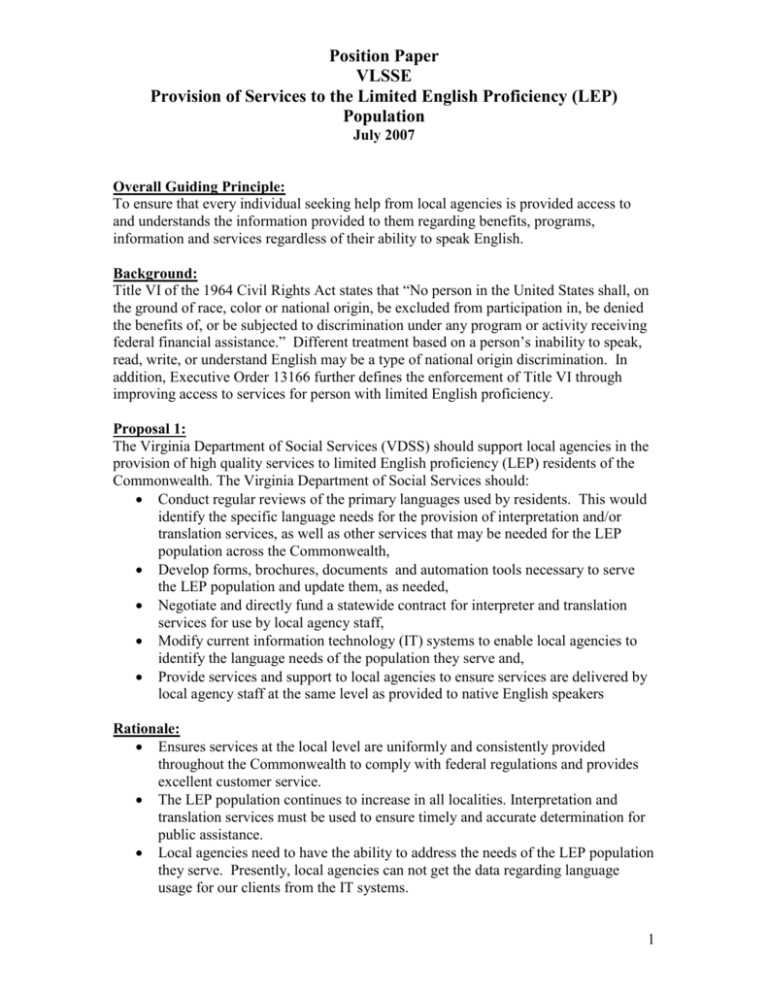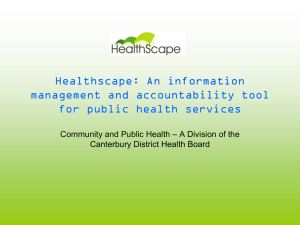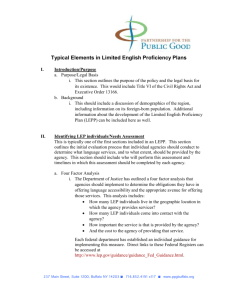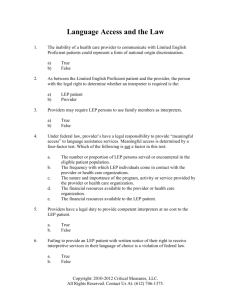Position Paper - Virginia League of Social Services Executives
advertisement

Position Paper VLSSE Provision of Services to the Limited English Proficiency (LEP) Population July 2007 Overall Guiding Principle: To ensure that every individual seeking help from local agencies is provided access to and understands the information provided to them regarding benefits, programs, information and services regardless of their ability to speak English. Background: Title VI of the 1964 Civil Rights Act states that “No person in the United States shall, on the ground of race, color or national origin, be excluded from participation in, be denied the benefits of, or be subjected to discrimination under any program or activity receiving federal financial assistance.” Different treatment based on a person’s inability to speak, read, write, or understand English may be a type of national origin discrimination. In addition, Executive Order 13166 further defines the enforcement of Title VI through improving access to services for person with limited English proficiency. Proposal 1: The Virginia Department of Social Services (VDSS) should support local agencies in the provision of high quality services to limited English proficiency (LEP) residents of the Commonwealth. The Virginia Department of Social Services should: Conduct regular reviews of the primary languages used by residents. This would identify the specific language needs for the provision of interpretation and/or translation services, as well as other services that may be needed for the LEP population across the Commonwealth, Develop forms, brochures, documents and automation tools necessary to serve the LEP population and update them, as needed, Negotiate and directly fund a statewide contract for interpreter and translation services for use by local agency staff, Modify current information technology (IT) systems to enable local agencies to identify the language needs of the population they serve and, Provide services and support to local agencies to ensure services are delivered by local agency staff at the same level as provided to native English speakers Rationale: Ensures services at the local level are uniformly and consistently provided throughout the Commonwealth to comply with federal regulations and provides excellent customer service. The LEP population continues to increase in all localities. Interpretation and translation services must be used to ensure timely and accurate determination for public assistance. Local agencies need to have the ability to address the needs of the LEP population they serve. Presently, local agencies can not get the data regarding language usage for our clients from the IT systems. 1 Proposal 2: To the extent that services and support are not directly provided to local agencies, VDSS should provide funding reimbursement over and above current administrative allocations for local agencies to: Contract for the purchase of vendor services for interpretation and translation services, if they are not provided through a state contract. Purchase or separately reimburse local agencies for needed supplies and equipment, such as speaker phones, phones and phone service capable of conference calls, brochures and other aids. Establish a certification program that tests bilingual staff on their foreign language proficiency. Provide additional compensation to bilingual employees that have been certified as proficient in a foreign language that is needed to serve the LEP clients and comply with Title VI. Rationale: The LEP population served by local agencies continues to increase. Local agencies continue to adjust the manner in which they provide services to accommodate the needs of this population. Local agencies frequently purchase interpretation and translation services from outside vendors to serve LEP clients. The expenses that are incurred by local agencies can be significant. Using vendors to provide interpretation and translation service is a practical way in which to address the multitude of languages used by our client population. In order to provide interpretation services telephonically, special equipment such a three-way speaker phones, must be purchased and available to local agency staff. It’s essential to have bilingual employees. In order to compensate them for their foreign language skills and the additional services they provide, some local agencies currently provide a stipend. The provision of a stipend is useful to attract and retain much needed bilingual staff. For local agencies to comply with Title VI, state funding must be available for serving the LEP population. The fiscal capacity of individual localities should not affect the quality of services to the LEP population. Benefit: Improved access to and utilization of services provided by local agencies for the LEP population and compliance with federal mandates. Improved efficiency and quality of services, both customer service and accuracy of information exchanged between customer and agency, thus reducing the possibility of case errors. 2 Proposal 3: The Virginia Department of Social Services (VDSS) should provide appropriate staffing levels for local agencies by: Ensuring that the Hornby-Zeller (HZ) workload study, currently being conducted, considers the additional time that it takes to serve the LEP population. Funding additional staff required, identified by HZ, for local agencies to serve the LEP population. Rationale: Serving the LEP population takes a great deal of additional staff time. When interpreters are used to conduct interviews, it can take twice as long to conduct an interview. Caseworkers first need to explain everything to the interpreter who then relays the information to the LEP individual, and then back to the caseworker. A bilingual caseworker’s interview may also take longer to complete because of the need to explain the meaning of technical terms and concepts that can be complex and totally foreign to the customer, and difficult to translate. Cultural differences must also be taken into account during an interview with those who are new to this country as well as LEP clients. This also takes additional time during the interview process. The LEP population is often more disenfranchised and frequently will use their caseworker as a point of contact for any type of information/questions that they may have, not just social services related information. Typically, a bilingual caseworker becomes the customer’s lifeline to their new world. LEP clients usually require additional verifications, especially with respect to alien status issues. Benefit: In addition to improved access to and utilization of services provided by local agencies for the LEP population, quality and timeliness of services provided would be increased thus reducing the demands for interventions by other agency service providers. Proposal 4: The Virginia Department of Social Services (VDSS) should provide mandatory training to staff in the requirements of the provision of services to the LEP population. Rationale: Consistency between local agencies in the provision of services to the LEP population. Appropriate usage of interpreter services such as when it is required and who is qualified to act as an interpreter Benefit: Compliance with Title VI by all local agencies as well as high quality service delivery. 3








